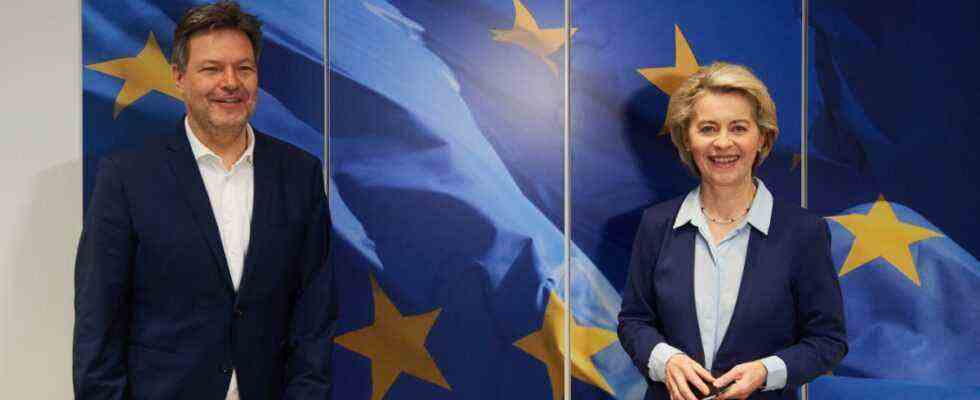In a blue suit and an open white shirt, Robert Habeck steps out of the Berlaymont building into the Brussels haze, very brave in temperatures around freezing point. The new German Economics Minister presented his climate policy government program during talks with President Ursula von der Leyen and other members of the Commission. The next joint steps towards a climate-neutral future were discussed, but of course one topic was of particular interest afterwards: taxonomy.
Whether his concerns about the classification of nuclear power as a “sustainable” form of energy have been heard and whether the Commission will accommodate him? Habeck only answered the first part of the question, yes, he was listened to. Secondly, he is silent. What was he supposed to say?
A debut as a loser
The taxonomy, intended to give investors a guide to sustainable finance, has given the green vice chancellor the worst possible start in the EU. Robert Habeck will probably never get out of the role of the loser – of all things on a topic that he considers completely superfluous.
“We don’t need it,” says Habeck about the delegated legal act with which the Commission wants to give nuclear and gas energy a green label as a transitional technology. An artificial financial market for this is unnecessary and contradicts the actual idea of the taxonomy to promote renewable energies. The federal government formulated its rejection last week in a statement on the Commission’s draft and also demanded corrections to the eligibility of gas power plants. The requirements are considered too strict.
The Commission will make its final decision in the near future, perhaps this week. After that, discussions will take place in the federal government, says Habeck, adding: “My personal political opinion is that if nuclear energy stays in place as it is now, then Germany should vote no.”
The Greens mobilize in Parliament
In all likelihood, the German No would change nothing, at least not in the Council of the 27 member states. 20 of the 27 would have to reject the legal act, which is not to be expected. Some countries, including Germany, need gas as a transitional technology. Other countries, such as France, are relying on nuclear energy in the transition. The Commission draft is a typical Brussels compromise.
The taxonomy could also fail due to an absolute majority in the European Parliament, but that is not to be expected either. Above all, the German Greens are making mood against it. This is not least due to the protest of the green base, which, like nuclear power, rejects the fossil fuel gas as a “sustainable” form of energy. Rasmus Andresen, spokesman for the German Greens, recently accused French President Emmanuel Macron of “allowing the French nuclear industry to pull him over the cart”. Ultimately, however, a coalition of gas and nuclear energy friends should also prevail in parliament.
Disagreement with France? Not so wild, says Habeck
The question remains: will the dispute over nuclear power, which has been carried out quite irreconcilably by the German side, cloud the Franco-German relationship in this phase, which is so difficult for Europe? Absolutely not, says Habeck, a few cute little clouds of breath accompany his answer. You know and respect the respective attitude. The French Council Presidency is going “very ambitiously” on climate policy issues, says Habeck, naming the guidelines for renewable energies and energy efficiency. With other parts of the “Fit-for-55” package, it will take longer.
Any discord in the EU is currently being overshadowed by the Ukraine crisis anyway. The gas deliveries from Russia and thus the security of supply for Germany and all of Europe were a central topic of the talks with Ursula von der Leyen, says Habeck. Fossil fuel independence, a primal green issue, has now become a key security issue. At least on that point, Habeck can feel confirmed that day.

